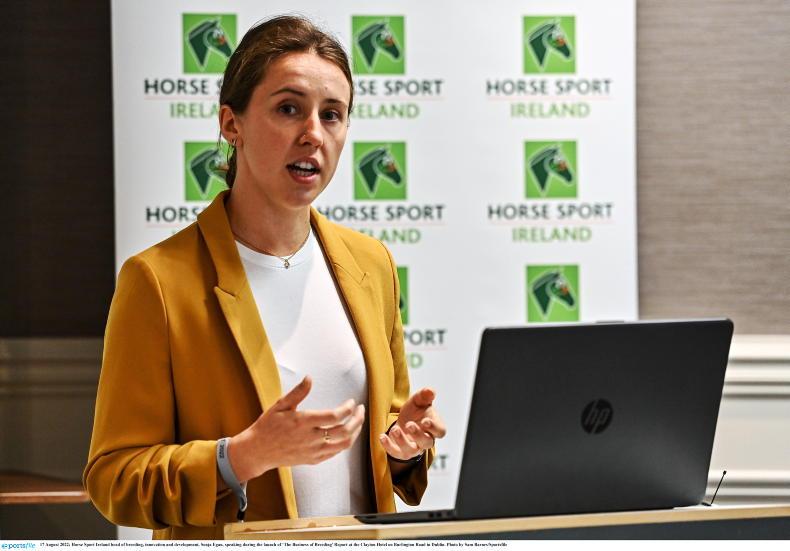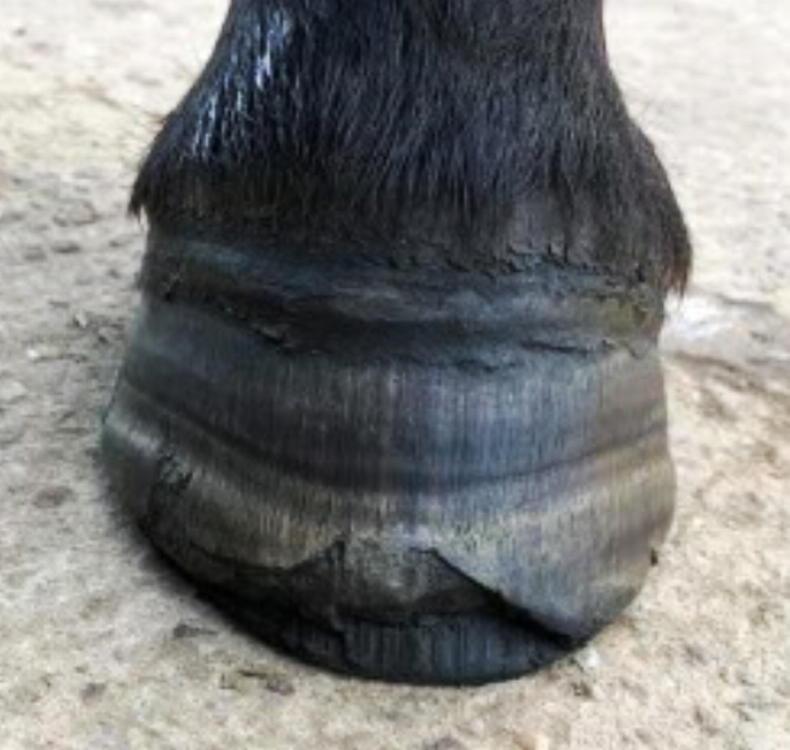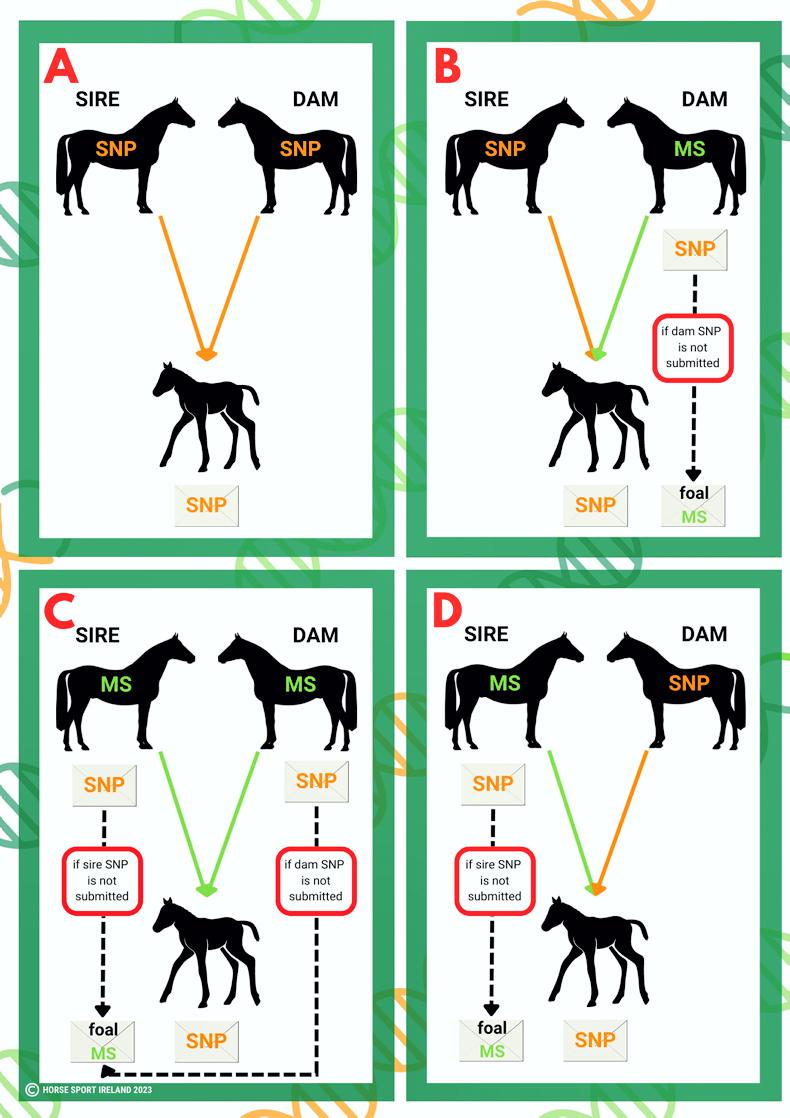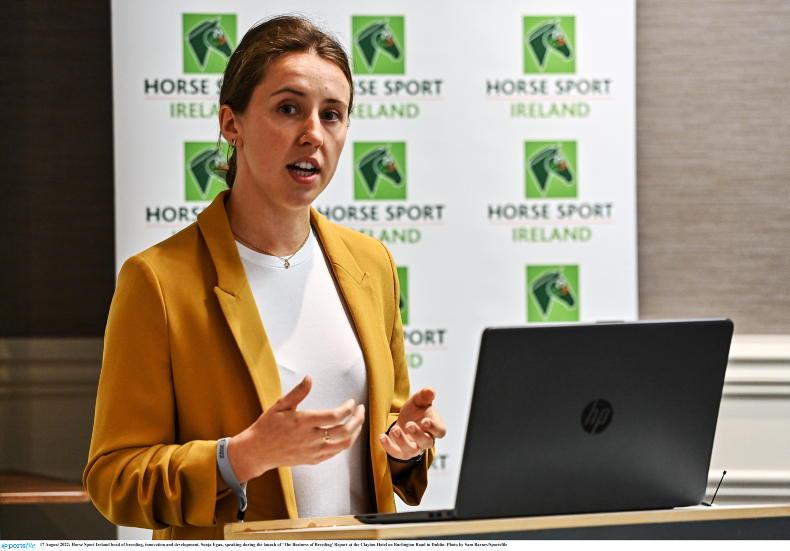IN 2022 Horse Sport Ireland (HSI) announced the Microsatellite (MS) to Single Nucleotide Polymorphism (SNP) DNA transition scheme. Phase I of the transition saw an invitation to all Department of Agriculture, Food, and the Marine (DAFM) sport horse studbooks to participate in the scheme, which was funded under National Breeding Services operated by HSI.
Participating sport horse studbooks were allocated several SNP tests in order to generate a ‘reference library’ of their active breeding herd.
To date, the Connemara Pony Breeders Society, Kerry Bog Pony Co-operative, Irish Harness Racing Association, Leisure Horse Ireland and HSI studbooks (Irish Sport Horse, Irish Sport Pony, Irish Draught, Irish Cob, and Irish Part-bred Cob studbooks) have re-analysed almost 10,000 mares and stallions on the SNP technology.
This re-sampled population provides the basis for phase II of the project, implementing SNP parentage verification for the 2023 sport horse foal crop.
This is a hugely significant move for the sport horse sector in Ireland; ovine and bovine parentage testing moved from MS to SNP testing in 2009. Equines are the only remaining species using MS for parentage verification. This transition provides Irish breeders with the opportunity to become world leaders in equine genetics, joining the KWPN and German Studbooks.
These studbooks used a combination of re-sampling (new/retrieved hair samples) and imputation - the mathematical re-construction of the parentage markers in a genotype for SNP onboarding.
Many breeders may be familiar with cattle genotyping, which has been leveraged in the bovine sector by the Irish Cattle Breeding Federation (ICBF). ICBF have utilised SNPs to research and identify traits in cattle related to macronutrient content, fertility, ease of calving, beef carcass, etc. This has allowed farmers to refine their breeding decisions and drive improvement in cattle breeding on the basis of genetic information.
There are significant advantages to using the SNP technology in horses such as improved accuracy of pedigree, preservation of rare lines, monitoring health related genes and potential abnormalities, predicting coat colour and, in time, research on other breeding and performance related traits.
What are Microsatellites (MS)?
Equine parentage testing in Ireland has been carried out using Microsatellite (MS) markers. These MS markers are simply short repeating segments of DNA. The pattern of these repetitions can be inherited from parent to foal, which allows MS markers to be used to verify parentage.
The technology used to analyse MS markers is outdated and the process is time consuming. At one point, MS was best practice in parentage testing and was used for all livestock species in Ireland, including bovine and ovine. More recently, breakdowns in MS technology have caused disruption to equine parentage verification as there are a limited number of engineers and parts available globally to support an increasingly redundant technology.
What is Single Nucleotide Polymorphism (SNPs)?
Single Nucleotide Polymorphism, abbreviated as SNP (pronounced ‘snips’), DNA analysis is a method of analysing single base or ‘nucleotide’ changes in DNA. This DNA is extracted from the hair samples submitted by breeders/owners to register pedigree of their foals.
SNPs are variations in a single nucleotide (A, C, G or T) in the DNA sequence and are highly stable and reproducible over time, making them ideal for genetic profiling. SNP sampling is coming under increasing focus from WBFSH sport horse studbooks, due to the associated advances in DNA sequencing technology and its ability to provide highly accurate and detailed genetic information. It is a valuable tool for breeders and researchers to determine the genetic makeup of individual horses, identify genetic predispositions to certain diseases, and make informed breeding decisions to improve the health and performance of horses.
What are the benefits of moving to SNP genotyping and parentage verification?
Both MS and SNP analyses are methods used to verify parentage and produce genotypes in horses, but there are differences between the technologies.
Some of the key benefits of SNP are as follows:
What does this change look like for Irish breeders?
Breeders will still require their vet to mark, and hair sample their foals. In some cases, only one parent will be SNP technology. This will require sire/dam AND foal hair samples for SNP typing. This is explained in detail on the graphic overleaf. Please ensure to submit all hair samples as directed in your foal kit. All hair samples must be returned to the Passport Issuing Organisation (PIO), not Weatherbys.
The Veterinary Council of Ireland and Irish Equine Veterinary Association have been notified of this transition, the potential for multiple sample bags and to return hair sample bags to the PIO.
What kind of sample is
required?
Good hair sampling is imperative for a successful transition. A minimum of 50 clean, intact hairs pulled from the root must be submitted to the PIO for SNP sampling.
These hairs must have the follicle/hair blub intact. Please ensure there is no soap or other residue on these hairs.
What is the cost?
There is no cost to the breeder for SNP testing of the sire, dam or foal.
Dam/sire SNP testing is supported by the DAFM-HSI National Breeding Services at 100%.
Foal SNP typing is supported by the DAFM Equine Technical Support fund at 70%, the other 30% is included in the studbook registration fee.
If a breeder requires a MS test, they will be required to cover the laboratory cost. MS technology is no longer supported by the DAFM and participating sport horse studbooks. It is important that stallion and mare SNP samples are submitted if requested to prevent this cost to the breeder.
How do I know if my
mare/stallion was included in the reference library?
It is not possible for any PIO to predict all potential breeding stallions and mares in the reference library. Please contact your PIO if you are breeding this year and would like to ensure your stallion/mare is on the SNP technology. If they are not, the studbook will issue the required sample bags. Many PIOs are working to upgrade their websites to offer an online ‘G’ (SNP genotype) checker function.
I am breeding from a non-
pregnant OR maiden mare; will she be on SNP?
She may be on the platform if she has foaled in the previous three years OR engaged in previous National Breeding Service schemes.
Please contact your PIO for confirmation or to receive a sample bag to submit for SNP testing ahead of foaling.
I am a stallion owner/agent, what do I do?
It is not possible for any PIO to predict all potential breeding stallions for inclusion in the reference library.
If you are a stallion owner or agent, you are obliged to ensure that your stallion meets the DNA testing requirements of the studbooks for which the progeny is to be entered. DAFM has declared that SNP is the DNA platform to be applied by the sport horse sector in Ireland.
Please contact your PIO to determine if a sample is required for the standing stallion(s).
This is particularly important for stallions standing abroad, where a hair or semen sample may be required to prevent the additional MS testing cost to breeders who are expecting 2023 foals.
SNP EXPLAINER

A
SIRE: The sire is SNP typed.
DAM: The dam is SNP typed.
FOAL: The breeder is only required to submit one (SNP) hair sample for the foal.
B
SIRE: The sire is SNP typed.
DAM: The dam is MS typed only. The breeder must submit a hair sample for dam SNP typing. If a dam SNP sample cannot be submitted, the breeder must purchase and submit a second foal sample for MS typing to obtain the foal’s studbook passport.
FOAL: If a dam SNP sample is received, the breeder is only required to submit one (SNP) hair sample for the foal. If a dam SNP sample cannot be submitted; the breeder must purchase and submit a second foal sample for MS typing to obtain the foal’s studbook passport.
C
SIRE: The sire is MS typed only. The breeder/stallion owner/agent must submit a hair/straw sample for sire SNP typing. If a sire SNP sample cannot be submitted; the breeder must purchase and submit a second foal sample for MS typing to obtain the foal’s studbook passport.
DAM: The dam is MS typed only. The breeder must submit a hair sample for dam SNP typing. If a dam SNP sample cannot be submitted; the breeder must purchase and submit a second foal sample for MS typing to obtain the foal’s studbook passport.
FOAL: If a dam and sire SNP sample is received*, the breeder is only required to submit one (SNP) hair sample for the foal. If a dam and sire SNP sample cannot be submitted; the breeder must purchase and submit a second foal sample for MS typing to obtain the foal’s studbook passport.
(*An MS sample is still required if only one parent submits a sample for SNP typing. A breeder will only ever be required to submit a maximum of two samples for the foal, one for MS and one for SNP).
D
SIRE: The sire is MS typed. The breeder/stallion owner/agent must submit a hair/straw sample for sire SNP typing. If a sire SNP sample cannot be submitted, the breeder must purchase and submit a second foal sample for MS typing to obtain the foal’s studbook passport.
DAM: The dam is SNP typed.
FOAL: If a sire SNP sample is received, the breeder is only required to submit one (SNP) hair sample for the foal. If a sire SNP sample cannot be submitted, the breeder must purchase and submit a second foal sample for MS typing to obtain the foal’s studbook passport.


 This is a subscriber-only article
This is a subscriber-only article
 It looks like you're browsing in private mode
It looks like you're browsing in private mode













SHARING OPTIONS: